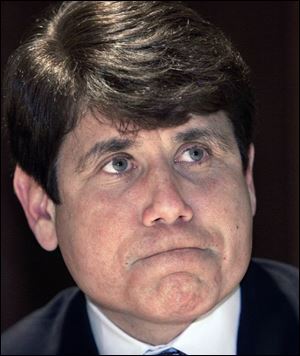
FBI arrests governor of Illinois
12/10/2008
Illinois Gov. Rod Blagojevich was a target of an FBI investigation, and dared agents to bug his offices and phones.
CHICAGO - The governor of Illinois brazenly put up for sale his appointment of President-elect Barack Obama's successor in the U.S. Senate, federal prosecutors said yesterday.
In taped conversations with advisers, the governor, Rod Blagojevich, seemed alternately boastful, flip, and spiteful about the Senate choice, which he likened at one point to that of a sports agent shopping around a free agent for the steepest price, a federal affidavit showed. At times, he even weighed aloud appointing himself to the job, the prosecutors said.
"I've got this thing," Mr. Blagojevich said on one tape, according to the affidavit, "and it's [expletive] golden. And I'm just not giving it up for [expletive] nothing. I'm not going to do it. And I can always use it. I can parachute me there."
Mr. Blagojevich, a Democrat, was arrested at his home at dawn yesterday on charges of conspiracy and soliciting bribes. His chief of staff, John Harris, was also arrested.
The corruption case extended well beyond the Senate appointment, stunned even a state that thought it had seen every brand of political corruption, created grave doubt over how or when Mr. Obama's successor in the Senate might be selected, and left many wondering who else might yet be implicated in Mr. Blagojevich's negotiations.
FBI agents targeted Mr. Blagojevich and Mr. Harris after secretly enlisting close associates, placing a bug in the governor's campaign office, and wiretapping his home phone, all with approval from Justice Department officials and a federal judge in the northern district of Illinois.
"The conduct would make Lincoln roll over in his grave," Patrick Fitzgerald, the U.S. attorney for the northern district of Illinois, said.
Under state law, Mr. Blagojevich is assigned to name a replacement for Mr. Obama, who recently resigned as Illinois' junior senator with two years left in his term.
Mr. Obama, who once supported Mr. Blagojevich but had distanced himself from the governor in recent years, told reporters that he was "saddened" by the arrests. Mr. Fitzgerald emphasized that the case "makes no allegations about the president-elect whatsoever."
Mr. Obama said he had not discussed his Senate seat with Mr. Blagojevich.
"I had no contact with the governor or his office, and so we were not - I was not aware of what was happening," Mr. Obama said. "And as I said, it's a sad day for Illinois."
The federal accusations against Mr. Blagojevich span beyond the Senate question into what the authorities here described as a "political corruption crime spree."
The governor is accused of racing to solicit millions of dollars in donations from people with state business before an ethics law bars such behavior in January, threatening to rescind state funds this fall from businesses whose executives refused to give him money, and pressuring the Chicago Tribune to fire members of its editorial board who had criticized him or lose the governor's help on the possible sale of Wrigley Field, which is owned by the Tribune Co. and is home to the Chicago Cubs.
Mr. Blagojevich, who looked somber at an appearance in federal court, was released from custody on a $4,500 recognizance bond after surrendering his passport. Sheldon Sorosky, his lawyer, later told reporters that the governor was "very surprised and certainly feels that he did not do anything wrong."
According to the affidavit, in more than a month of recorded phone calls at his home and campaign office, Mr. Blagojevich considered numerous ways that he might personally and politically gain from the Senate candidates, none of whom were identified by name in the court filing. One possible choice might be able to help him secure a post with the new administration as secretary of health and human services or energy; a "three-way" deal involving a union, and another candidate might win him a union leadership post. Or perhaps he could secure the high-paying helm of a nonprofit organization that could be created for him.
Mr. Blagojevich, whose administration has for years been known to be the subject of a federal corruption investigation, also spoke of his family's financial woes and said he had three criteria for selecting the new senator: "Our legal situation, our personal situation, my political situation - this decision, like every other one, needs to be based on that."
In several scenarios, the affidavit says, Mr. Blagojevich seemed to refer to plans under way to make money or win a job - for him or his wife, Patti - in exchange for a particular Senate selection, raising the specter that there might be others, including some of the unnamed Senate candidates, who were participating or at least considering participating in such deals.
In one case, Mr. Blagojevich told an adviser that he was giving greater consideration to appointing one candidate - described only as Senate Candidate Five - after an approach by "an associate" of that candidate who, the governor told an adviser on tape, offered to raise $500,000 for the governor, while another emissary of the senate hopeful offered to raise $1 million if Senate Candidate Five was indeed selected. "We were approached 'pay to play,'•" Mr. Blagojevich said on tape.
But prosecutors issued a plea yesterday for people to come forward with information and cautioned against drawing any conclusions about candidates' or anyone else's true roles in Mr. Blagojevich's plans.